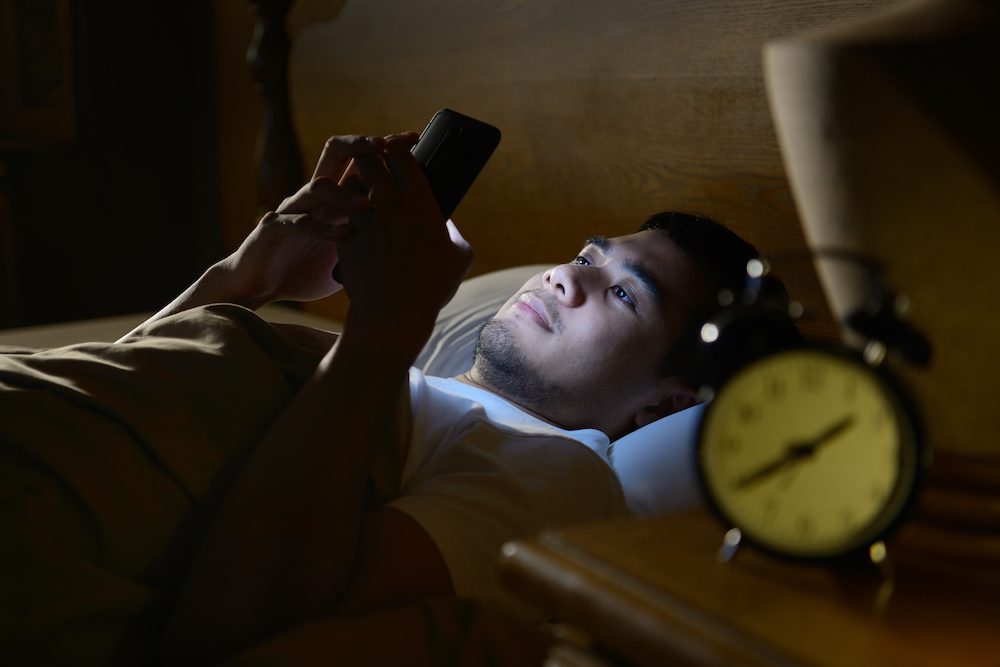Your body needs regular, restful sleep to stay healthy and function properly. Sleep plays an important role in a range of mental and physical processes, from repairing cells and regulating hormones to the formation of memories. Without sleep, it is harder for the body to fight infections and recover from illnesses.
Despite the importance of sleep, there are a number of reasons why people find themselves struggling to fall asleep. Sometimes, these reasons are minor, such as consuming caffeine too close to bedtime or trying to sleep in a noisy environment. However, in some cases, trouble sleeping is a sign of a more serious issue like depression or a sleep disorder.
Learning methods for falling asleep quickly may alleviate the stress of tossing and turning and help you get better, longer sleep. We look at how to fall asleep fast, what to do if you can’t sleep, and how activities like meditation before bed can help you get better rest.
Top 5 Tips to Fall Asleep Fast

- 1 Lower the thermostat to help the body drop in temperature.
- 2 Take a shower or bath to promote relaxation.
- 3 Try mindful meditation to calm racing thoughts.
- 4 Focus on slowing your breath and mentally count through each exhale.
- 5 Remove electronics and eliminate all sources of light in the bedroom.
Creating a bedtime routine can help tune your internal clock to fall asleep faster.
Lower the Thermostat
Research suggests that room temperature can have an impact on sleep. Body temperatures drop when people fall asleep, and in order to balance this reduction in temperature, most people use bedding to create a warm “microclimate” around their body. A cooler room temperature can encourage a sleeper to curl up under a blanket, which warms the skin and accelerates the process of falling asleep.
If you are having trouble falling asleep, try setting your thermostat between 65 and 68 degrees Fahrenheit. If you do not have air conditioning, consider reducing the temperature in the bedroom by opening doors and windows to promote air flow, using a fan, or covering windows with dark curtains.
Take a Warm Shower or Bath
Bathing in hot or warm water may also help people fall asleep faster. A hot bath can trigger changes in a person’s body temperature that promote relaxation and sleepiness. Several studies have shown that those who take a warm bath or shower within two hours of bedtime report better overall sleep quality. Even spending just 10 minutes in a warm bath can help people fall asleep faster and spend less time in bed awake.
Exercise Earlier in the Day
Regular physical activity is associated with better sleep and may even help to prevent insomnia. Although researchers are not entirely sure why exercise promotes better sleep, some suggest that people who struggle to fall asleep may have problems lowering their core temperature at night. Working out may help regulate the body’s temperature.
However, exercising too soon before bedtime may keep some people awake at night. If you regularly struggle to fall or stay asleep, avoid working out less than two to three hours before you go to bed, especially in a brightly lit gym. Bright lights and vigorous exercise before bed may disrupt some individuals’ sleep cycles and prevent the body from releasing hormones required for sleep.
What Type of Exercise Is Best for Sleep?
All types of exercise have the potential to improve sleep, even a daily 10-minute walk. Certain exercises may be especially helpful to people who have a hard time getting a good night’s sleep.
- Cardio and Aerobic Exercises: Exercises that increase the activity of the heart and lungs can reduce the symptoms of depression and obstructive sleep apnea, improving overall sleep quality.
- Strength Training: Resistance exercise and strength training may also relieve symptoms of obstructive sleep apnea and lead to better sleep when practiced consistently.
- High-Intensity Workouts: Regular high-intensity interval training may reduce the symptoms of depression and help people fall asleep faster.
- Yoga: Practicing yoga and stretching before bed may help some fall asleep faster, as well as lead to an improved mood and overall well-being.
Practice Meditation
Meditation techniques focus the attention and help people have calm reactions to stressful thoughts and situations. Although there are many different types of meditation, most involve focusing, breathing steadily, and maintaining a particular posture in a quiet space. Studies show that certain practices, including mindfulness meditation, may promote better sleep.
Before you begin meditating, choose a quiet place without distractions where you will not be interrupted. Breathe slowly as you focus your attention on a word, object, or phrase of your choice, allowing thoughts to pass through your mind without losing your focus.
For other ideas and techniques, it may be helpful to contact in-person or online organizations that support meditation practices.
4-7-8 Method
Dr. Andrew Weil popularized the 4-7-8 method, a type of meditation meant to help people relax. Dr. Weil claims that this meditation acts as a natural tranquilizer that grows more effective the more you practice it.
The 4-7-8 method includes the following steps:
- Sit up straight with the end of your tongue behind your top front teeth throughout the exercise.
- Breathe out through your mouth, saying “Whoosh.”
- With your mouth closed, breathe in through your nose as you mentally count to four.
- Hold your breath while mentally counting to seven.
- Breathe out through your mouth and say “Whoosh” as you mentally count to eight.
- Breathe in and repeat the steps above three times.
Dr. Weil suggests performing the 4-7-8 method at least twice a day, although he cautions people to avoid doing more than four repeated breaths per session in their first month of practicing the meditation.
Avoid Electronics Before Bed
While it may be tempting to turn on the TV or check your phone when you are tossing and turning, electronics might make it harder to fall asleep. Electronic devices such as TVs, smartphones, laptops, and tablets are not only distracting, they also emit blue light, which can negatively affect the sleep cycle. Being exposed to bright light or blue light within two hours of bedtime causes people to stay alert longer and feel sleepy later.
Fortunately, there are some measures you can take to use electronics in the evening without interfering with your sleep cycle. Special blue-blocking glasses may help people fall asleep faster, even if they are exposed to blue light before bed. In addition, some devices now come with blue light filters that automatically turn on at a certain time of day.
Keep a Consistent Sleep Schedule
Bedtimes and wake-times can vary from person to person, but most adults should get about seven to eight hours of quality sleep each night. Going to bed and waking up at the same time every day is a good habit that encourages healthy sleep.
Try to keep a consistent sleep schedule, even on days when you do not have to get up early. When you stay up late or sleep in, you disrupt your usual patterns of light exposure and alter your sleep cycle, which makes it more difficult to fall asleep in the future. In contrast, a regular sleep schedule trains the body to sleep at certain times.

Create a Bedtime Routine
A person’s internal clock helps their body flow through certain biological processes, including feeling alert or tired, every 24 hours. Light cues from the environment can influence the sleep cycle by altering the internal clock, making a person sleepy or keeping them awake.
When a person’s internal clock is consistently exposed to the same patterns of light and dark, they begin to feel sleepy at an appropriate time and fall asleep quickly. When they are exposed to inconsistent patterns, their internal clock becomes confused, making it harder to fall asleep. A regular bedtime routine helps train the body’s internal clock to maintain a healthy sleep cycle.
There are a number of ways to relax and unwind before bed. Many people begin their bedtime routine by lowering the lights, performing a skincare routine, bathing, or meditating. Since many other activities can help you relax as well, you may want to experiment to find what works best for you.
- Find a Relaxing Playlist: Listening to music before bed may help people fall asleep faster. Create a playlist that helps you unwind and gives you a sense of comfort and positivity.
- Read a Book: Reading before bed may improve sleep quality. To avoid blue light exposure, stick to paperbacks and hardbacks or use a blue light filter on your e-reader.
- Make a List: Spending a few minutes before bed writing detailed to-do lists may help some people reduce anxiety about the future and fall asleep more quickly.
- Keep a Journal: Writing about future events in a highly specific way may also lower anxiety and help people fall asleep faster.
Try the Military Method
First described in a book called “Relax and Win: Championship Performance,” the Military Method was developed to help U.S. Navy pilots fall asleep in under two minutes.
- Starting at the top of your head, relax the muscles in your face and mouth.
- Lower your shoulders to release tension.
- Let your hands fall to your sides.
- Relax your chest as you exhale.
- Relax your legs, from your thighs to your ankles.
- For 10 seconds, imagine a relaxing image or scene.
- If you cannot clear your mind through imagery, repeat “don’t think” over and over for 10 seconds.
While this method is based on basic relaxation techniques, you may need to practice it for up to six weeks before you see results.
How Long Should It Take to Fall Asleep?
Sleep needs and habits vary considerably between individuals, and there is no single amount of time to fall asleep that is considered “normal.” Sleep specialists also acknowledge that the time it takes to fall asleep cannot be used on its own to diagnose a sleep disorder. Instead, they use a combination of tests to assess patients for sleep deprivation.
If you are unsure or concerned about how long it takes you to fall asleep, consider whether you have any symptoms of sleep deprivation, such as:
- Daytime fatigue or sleepiness
- Difficulty getting up in the morning
- Reduced attention span
- Irritability, depression, or anxiety
If you are experiencing any of these symptoms, you may wish to discuss them with a health professional.
Trouble Sleeping?
We can help. Tell us about your sleep to get a free Sleep Doctor score with recommendations for better sleep.
Frequently Asked Questions About Falling Asleep
Many things can make it hard to fall asleep, including caffeine use, stress, shift work, and travel. Sleep disorders can also keep people awake at night. Your healthcare provider can help you determine why it takes you a long time to fall asleep.
You may have trouble falling asleep fast if you drink caffeine or alcohol before bed, if you are stressed or anxious, or if you have a sleep disorder.
Melatonin may help some people who have trouble falling asleep at a reasonable time. However, melatonin might interact with certain medications, so talk to your doctor before you try it.
References
Ask the Sleep Doctor
Have questions about sleep? Submit them here! We use your questions to help us decide topics for articles, videos, and newsletters. We try to answer as many questions as possible. You can also send us an email. Please note, we cannot provide specific medical advice, and always recommend you contact your doctor for any medical matters.



